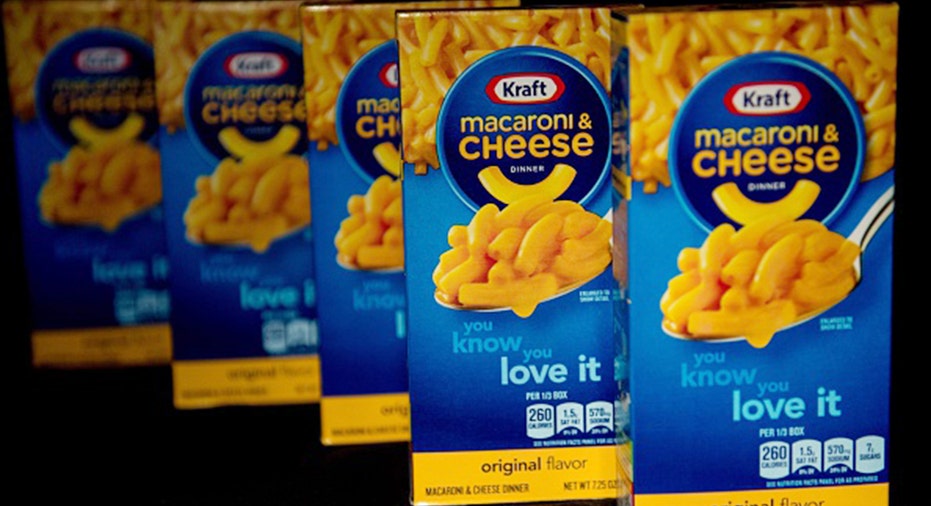She polices social distancing at Kraft’s mac-and-cheese factory during coronavirus

This photo illustration shows packs of Kraft's macaroni and cheese in Washington on April 21, 2015. From January next year, two kinds of yellow dye will no longer be added to the packaged dry pasta and processed cheese mix that is famous for its gooe
The coronavirus hit a Kraft Heinz Co. macaroni-and-cheese factory last month, forcing Brooke Burk to make a change that is a bit out of character for someone who deals with people all day.
Ms. Burk, a human-resources staffer, asked to have a plexiglass shield installed around her desk to separate her from other employees while she meets with them. “It kind of looks like a fish tank in here,” she said during a recent interview from her office at the Springfield, Mo., factory.
KRAFT HEINZ LAUNCHES CORONAVIRUS RELIEF INITIATIVE TO HELP STRUGGLING US DINERS
She could be working from home, but has decided she needs to be there in person to support line and warehouse workers. She implements and enforces social distancing at the factory—from production lines to the breakroom to the human-resources office where she sits.
That job got tougher when two people in the warehouse were diagnosed with Covid-19 last month. “I was just inundated with people coming in, you know, nervous and scared,” Ms. Burk said.
Kraft Heinz alerted workers using an emergency response system set up mostly for severe weather. The factory was closed for a couple of days in late March for deep cleaning, and management ramped up preventive measures when it reopened.
After the reopening, a few more people who had gone out sick were tested for Covid-19. “Those were people that I had interacted with,” she said. “That was kind of like a defining moment.” They ended up testing negative.
HORMEL FOODS GIVING MORE CORONAVIRUS BONUSES TO PRODUCTION WORKERS
There has been little time to slow down and catch a breath.
Food companies are racing to meet unprecedented demand for items like Oscar Mayer deli meat or Velveeta cheese. While a small number of the nearly 1,000 employees at the plant are able to work from home, most need to be present.
“We do need them here. We do need them to feel safe while we’re here. Because we need to keep getting that food out the door,” Ms. Burk said.
Ms. Burk, 46, has printed out signs about hand-washing, and put markings on the floors of the cafeteria and the factory to keep people at a distance from each other. She put signs on the tables in the break room that said, “Don’t sit here, sit here,” to keep people 6 feet apart.
One department slowed a production line to allow 6 feet of space between workers that pass items back and forth by hand. It takes them longer to walk back and forth now.
GET FOX BUSINESS ON THE GO BY CLICKING HERE
Ms. Burk made sure every table in the cafeteria had hand sanitizer. She helped hire three temporary workers to clean doorknobs, table tops and other surfaces. Management spread out time clocks to keep employees from congregating while clocking in and out.
“It honestly was a really, really crazy time for that first couple weeks,” she said. “Since then, I can’t say that it’s gotten any less crazy.”
The health risk and long hours have been a strain on her family. Ms. Burk’s wife, Amanda, who she has been with for almost 24 years, is at home with their four children, who range in age from 6 to 17. “I have the easier job. But it’s a little stressful,” Ms. Burk said.
The factory has implemented a health screening, asking workers a few questions before they enter, and this week started taking their temperatures.
Ms. Burk also had nearly all the chairs removed from the cafeteria so that people sit farther apart during their lunch break. “People were just moving chairs. So we were like, ‘Nope, we’ve got to take this a step further,’” she said.
CLICK HERE TO READ MORE ON FOX BUSINESS
Kraft Heinz has also been working on getting masks to all its factory workers, but they have been in short supply. All factories will have them by Wednesday, a spokesman said.
Ms. Burk said she saw corporate workers posting pictures of themselves working from home last month on Kraft Heinz’s internal social media platform, KetchApp. She took photos on the factory floor and posted them along with captions that included the hashtag “#WeGotYouAmerica.” It caught on outside the factory.
“When I went to the store and saw the panic that was happening there with people hoarding food and toilet paper, I wanted them to know,” she said. “There’s no need to buy all the mac-and-cheese on the shelf. We are here making it.”



















